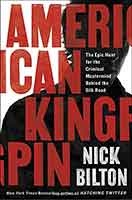American Kingpin by Nick Bilton
[Y]ou shall serve your life in prison
. With those words, the judge handed down a sentence that few had expected. A lengthy prison term? Sure. But life? That was not expected. But it was real, and thirty-year-old Ross Ulbricht - a.k.a Dread Pirate Roberts - would spend the remaining sixty or so years of his life in prison, seeing the people outside go on with their lives while he simply aged.

ISBN: 9781591848141
Virgin Digital, 2017-05-07
English
A story about drugs, technology and hubris, that mirrors Silicon Valley and ends in just the tragedy you would expect. (5/5)
He would do so because he had run an on-line black market for illegal drugs, called the Silk Road. It had operated as a "hidden service" on the TOR network, an extension to the "normal" Internet that allowed one to set up websites whose location can't be traced to an Internet address, and thus, not to a specific hosting company or customer of that company. But doing so requires that you don't leak the Internet address by other means, and this was one of the things that led to the downfall of the Silk Road's creator.
As I followed in Ross Ulbricht's steps as he built his on-line drug empire, ordered people murdered, and held speeches about transforming the world, I couldn't help but think just how very Silicon Valley this all was in its hubris; and how very much like the Pirate Bay trial it was in its premeditation and misunderstanding of the law.
Leader who compares himself to Steve Jobs? Check. Out to "disrupt" and "transform the world"? Check. Describes their business as a "cause" or "mission"? Check. Excuses the suffering they cause with the greater good? Check.
I have been lucky to work with CEOs who would make lousy cult leaders, and whose only desire has been to grow market share and profits. They want your skills and your work - but not your soul. When Ulbricht compares working on the Silk Road to building a cathedral to the glory of God, it's easy to suspect that the God of the Silk Road cathedral is none other than Ulbricht himself. This attitude is, sadly, common in the Valley. Since it appears that everyone is making boatloads of money and are changing the world, who can blame someone for not wanting to be the same as their peers? Just convince yourself that laws, instead of providing a framework for millions of people to get along, is just something holding you back. Then shoot up some Ayn Rand to provide the moral framework for doing as you please because you can.
And Steve Jobs. Of course, Steve Jobs. Everyone seems to want to be Steve Jobs; or, at least, seems to think that appeal to Jobs justifies any action.
Utilitarian and libertarian? There aren't check marks big enough.
Humans have an innate sense of justice and fairness. We also have an incredible ability to rationalize our decisions. Obviously, these two qualities don't work well together. In particular, by assigning a large enough utility to a potentially perfect future, any act, no matter how depraved, is justified.
Thinks they have a "smart defense" that makes them untouchable? Check.
Just as the people behind The Pirate Bay had their defense figured out before the trial, so did Ulbricht. And just as the defense the pirates of the bay had thought up, the same amateur concoction of rickety legal arguments and sophistry collapsed to the detriment of the defendant. The pirates thought they could get around the law by hand-waving about BitTorrent and hashes; Ulbricht thought that by hiding behind an alias he could disown the whole criminal enterprise if the law ever caught up with him. Both were wrong.
What about the book then? It's good. You should read it.